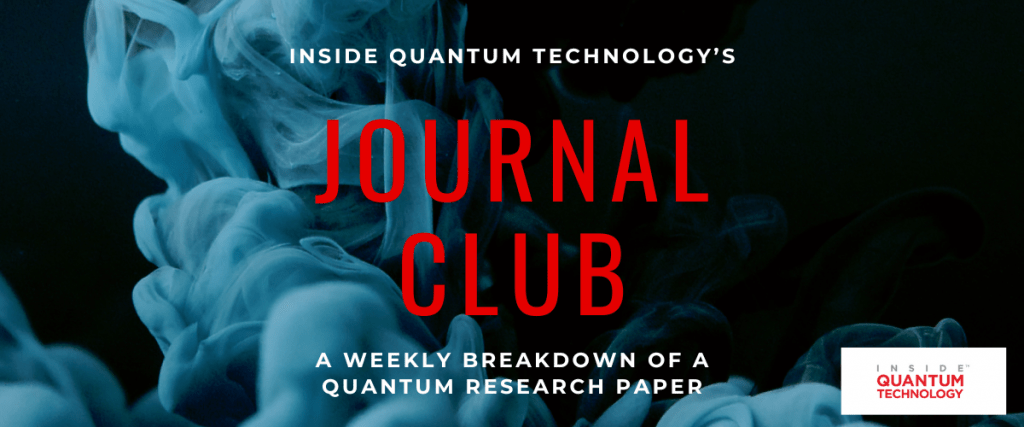IQT’s “Journal Club” is a weekly article series that breaks down a recent quantum technology research paper and discusses its impacts on the quantum ecosystem. In this article, we focus on IoT (the Internet of Things) and new findings about its interactions with quantum technology.
The modern world is increasingly reliant on data. From business decisions to everyday operations, data forms the backbone of numerous aspects of society. However, with the growing importance of data comes the need for robust security measures to protect it from tampering and misuse. This is where advanced cryptographic systems, including blockchain and quantum technologies, come into play. These technologies are crucial for data security, but their complex requirements often hinder widespread adoption. A new study in the Institution of Engineering and Technology Blockchain delves into the potential of a Quantum-IoT-based data protection scheme, particularly relevant to Industry 4.0. It explores the advancements in quantum computing that promise to address current and future data security challenges.
The IoT Revolution and Security Challenges
The onset of Industry 4.0 has positioned the Internet of Things (IoT) as a critical component in modern industrial processes. IoT facilitates real-time interactions between machines, sensors, and humans, leading to unparalleled automation and efficiency in sectors like manufacturing and logistics. However, this rapid expansion raises significant concerns about the security and privacy of the data transmitted and stored across IoT networks. While blockchain technology has emerged as a promising solution for securing data, offering a tamper-evident and decentralized ledger, it has limitations. New security threats continuously emerge, necessitating more robust solutions.
The Quantum Leap in Data Security
Quantum computing introduces a paradigm shift in approaching data protection and security. Leveraging principles like superposition and entanglement, quantum computing offers a level of security for data storage and transmission that is unattainable with traditional methods. This research paper proposes a novel solution – the Quantum IoT-blockchain (QIoT) fusion. This cutting-edge technology merges the decentralized security of blockchain with the advanced capabilities of quantum computing, promising a superior level of data protection for Industry 4.0 applications. The paper comprehensively analyzes QIoT’s architecture, protocols, algorithms, and effectiveness in real-world scenarios.
Related Work and Emerging Solutions
Integrating quantum computing and blockchain for securing IoT data is a burgeoning field of research. Various frameworks and solutions, such as Check Point Software’s quantum IoT protection and solutions based on post-quantum blockchain architectures, are being developed. These innovations leverage quantum-resistant encryption and key management technologies to protect IoT devices and networks from cyberattacks. A noteworthy development is the introduction of quantum signatures in blockchain, enhancing communication security in IoT systems. This evolving landscape highlights the need for continuous innovation in securing IoT networks against increasingly sophisticated threats.
Quantum Technologies: The Future of IoT and Blockchain Security
Quantum technologies extend beyond computing, including secure communication systems and highly sensitive sensors. They are pivotal in developing faster and more powerful computing devices. Quantum encryption, a subset of these technologies, uses quantum mechanics principles to achieve a high level of security unachievable with classical methods. It involves transmitting information via individual photons, ensuring secure key distribution.
As IoT grows and plays a pivotal role in modern industry, the need for robust, innovative security solutions becomes increasingly critical. As explored in this paper, the fusion of quantum computing and blockchain technology represents a significant advancement in protecting IoT data. The Quantum-IoT-based data protection scheme offers a glimpse into the future of data security, where advanced quantum technologies are leveraged to safeguard the integrity and privacy of data in an ever-connected world. This research addresses current security challenges and lays the groundwork for tackling future threats in the ever-evolving landscape of data security.
Kenna Hughes-Castleberry is the Managing Editor at Inside Quantum Technology and the Science Communicator at JILA (a partnership between the University of Colorado Boulder and NIST). Her writing beats include deep tech, quantum computing, and AI. Her work has been featured in Scientific American, Discover Magazine, New Scientist, Ars Technica, and more.
